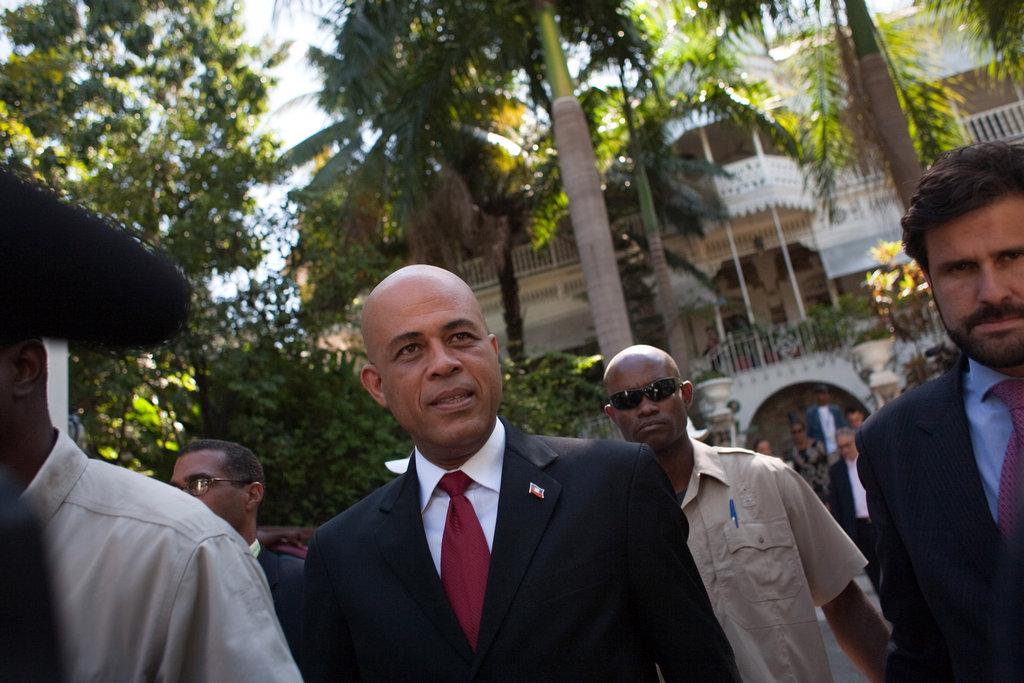The ghosts of Haiti’s Hotel Oloffson
Michel Martelly, then a Haitian presidential candidate, in front of the Oloffson Hotel on February 3, 2011 in Port-au-Prince, Haiti.
PORT-AU-PRINCE, Haiti – The wooden balcony of the Hotel Oloffson still creaks with a history that is as rich and relevant as ever.
The hotel, with its faded but still-grand 'Ginger Bread' architecture, somehow managed to survive the earthquake with its twisting wooden staircase, its inviting porch and its ancient swimming pool all intact.
Perched on the edge of a hill looking out over the mountains and the distant blue waters of the sea port, the Oloffson was a favorite haunt of Graham Greene. It was the muse for the fictional Hotel Trianon in his 1966 novel, The Comedians, a classic tale of treachery, good intentions, despair and the absurdity of Haiti set amid the rule of "Papa Doc" Duvalier.
The three main characters are Brown, the hotelier, Smith, the innocent American, and Jones, a confidence man, and it is my favorite Greene novel. I first read it at the urging of the Reuters correspondent turned New York tabloid editor John Cotter, who covered Haiti in the 1980s. The book was lovingly placed in Cotter’s casket when he died too young in 1992. Cotter had uncanny instincts for a good story and that’s why he loved Haiti. He was a wild man with a cackling laugh that I can almost hear echoing around somewhere near the bar in this old hotel where he often stayed.
Ghosts are everywhere in Haiti. And so is history.
More from GlobalPost: HDS Greenway's 'The War Hotels'
The Oloffson was built in the late 19th century as the private home of the Sam family. Guillaume Sam, who hailed from the wealthy family, was named president for a mere five months before he was torn to pieces by an angry mob, a fate that has befallen several Haitian rulers, including Dessalines, one of the founding fathers of its revolution. Haiti’s political history devours its leaders in blood and violence. And as political uncertainty creeps back from the shadows with the unsteady cadence of a disabling limp, Haiti’s recently elected President Michael Martelly should listen carefully to those approaching footsteps and study his history.
In 1935, the Sam home was converted to a hotel by Walter Gustav Oloffson, a Swedish sea captain. At one point, the grand, sprawling structure was occupied as a military hospital by the United States when naval ships took its port during one of several American military interventions on the tiny and desperately poor nation whose proximity to the richest and most powerful nation in the world makes for embarrassing irony, and on some level perhaps an expression of guilt that America has never quite figured out how to resolve.
During the 1950s and 60s, the hotel was frequented by Charles Adams and Graham Greene and many artists and writers. In the 1970s and 80s, it became a playground for celebrities, including Mick Jagger and Jackie Onassis. The suites of the hotel are today named after all those of fame who have slept here.
More from GlobalPost: Return to Haiti: A day in the life of a broken island
As the death grip of Duvalierism closed in on Haiti and tourism virtually dried up in the 1980s, the hotel was taken over by Richard A. Morse. He lovingly restored it (although today it clearly needs more love and definitely more paint.) Through all of the violence and the tragedy and the hope of Haiti, on Thursday nights Morse’s own band RAM (his initials) has presided over their own unique, weekly celebration of Haiti’s traditional music and dance into which they infuse their own politics of dissent. And it is still a meeting ground for Haiti’s educated class, artists, foreign correspondents, diplomats, NGO workers and a cast of characters, well, straight out of Graham Greene.
So not much has changed since Greene sat in a favorite corner of this creaking porch while observing this place, drawn in by the shadows, the shafts of light and the shades of gray that are Haiti.
You can read the first part of the Ford Foundation-funded continuing series at “Fault Line: Aid, Politics and Blame in Post-Quake Haiti.”
![]()
The story you just read is accessible and free to all because thousands of listeners and readers contribute to our nonprofit newsroom. We go deep to bring you the human-centered international reporting that you know you can trust. To do this work and to do it well, we rely on the support of our listeners. If you appreciated our coverage this year, if there was a story that made you pause or a song that moved you, would you consider making a gift to sustain our work through 2024 and beyond?
